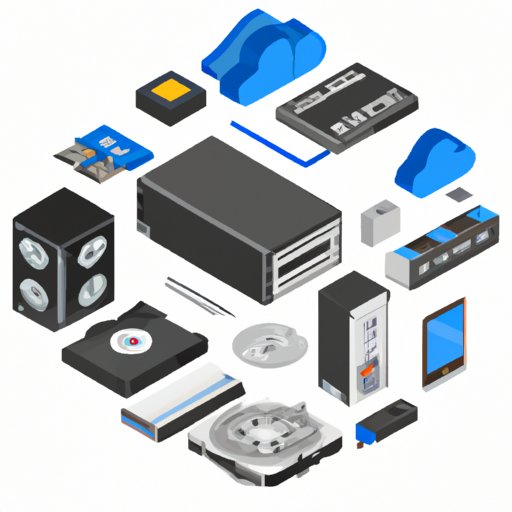
Introduction
Running out of storage space on a computer can be frustrating and inconvenient. Whether you use your computer for work, personal projects, or entertainment, having ample storage space is essential. Unfortunately, many people face this common problem, particularly with the increasing storage requirements of modern software and media files. Fortunately, there are several solutions to this problem, each with its own benefits and drawbacks. This article will explore different ways to get more storage on your computer.
Optimize Your Current Storage
Before seeking additional storage, it is essential to maximize the use of your existing storage. One primary way to optimize your current storage space is to organize your files. Keeping files organized helps prevent clutter and makes it easier to find what you need. You can use folders and subfolders to group related files, and you may want to consider using naming conventions that help you remember which files are which.
Deleting unnecessary files is another way to optimize your current storage. Over time, your computer may collect a significant amount of junk data, such as temporary files, duplicate files, and old backups. Removing these files can free up significant space on your hard drive. Additionally, uninstalling applications that you do not use can help free up space and reduce clutter.
Clearing out your browser cache regularly can also help free up storage space. Your browser saves a significant amount of data, including temporary files, cookies, and browsing history. Clearing these out can help free up space and may also improve your browser’s performance.
Use External Hard Drives
External hard drives are a popular storage solution for people who need additional space for large media files or backups. External hard drives connect to your computer through a USB port and allow you to store files externally. One advantage of external hard drives is that they are portable and can be easily moved between computers. Additionally, external hard drives can offer a significant amount of space at a reasonable cost.
When choosing an external hard drive, it is important to consider the storage capacity, speed, and reliability. Look for a drive with a sufficient amount of storage for your needs and a fast transfer rate to speed up file transfers. Additionally, consider the durability and build quality of the hard drive to ensure that it can withstand regular use.
Use Cloud Services
Cloud storage services are another popular solution to the problem of limited storage space. Cloud services allow you to store files in remote servers rather than on your computer’s hard drive. This has several advantages, including remote access to files, automatic backups, and the ability to share files with others easily.
Many cloud services are available, including Google Drive, Dropbox, and OneDrive. When choosing a cloud service, consider the storage capacity, pricing, and features offered. Additionally, ensure that the service you choose integrates well with your existing workflow and software.
Upgrade Your Internal Hard Drive
If you have a desktop computer or are comfortable opening up your laptop, upgrading your internal hard drive is another option for getting more storage. Upgrading your internal hard drive can be a cost-effective way to get more space and can also improve your computer’s overall performance.
When choosing an internal hard drive, consider the storage capacity, speed, and reliability. Additionally, ensure that the hard drive is compatible with your computer’s hardware and that you have the necessary tools and expertise to install it correctly.
Use Compression Tools
Compression tools are software applications that compress files to take up less storage space. This can be helpful for large files such as media files and archives. Popular compression tools include ZIP and RAR.
One advantage of compression tools is that they can significantly reduce the amount of space required to store certain files. However, compressed files need to be decompressed before they can be used, which can be time-consuming.
Use Network Attached Storage (NAS)
Network-attached storage (NAS) is a storage solution that involves a dedicated storage device connected to a network. NAS offers several benefits, including easy access to files from multiple devices, automatic backups, and data redundancy.
When choosing a NAS device, consider the storage capacity, data transfer rates, and additional features such as media streaming. Additionally, ensure that the device is compatible with your existing network and devices.
Conclusion
Running out of storage space on your computer is a frustrating problem, but there are several solutions. Optimizing your current storage and deleting unnecessary files is the first step. External hard drives, cloud storage, and NAS devices are all useful options for storing additional files. Upgrading your internal hard drive and using compression tools are additional options. The right solution will depend on your specific needs and budget. By exploring these different options, you can ensure that you have ample storage space for your files.





